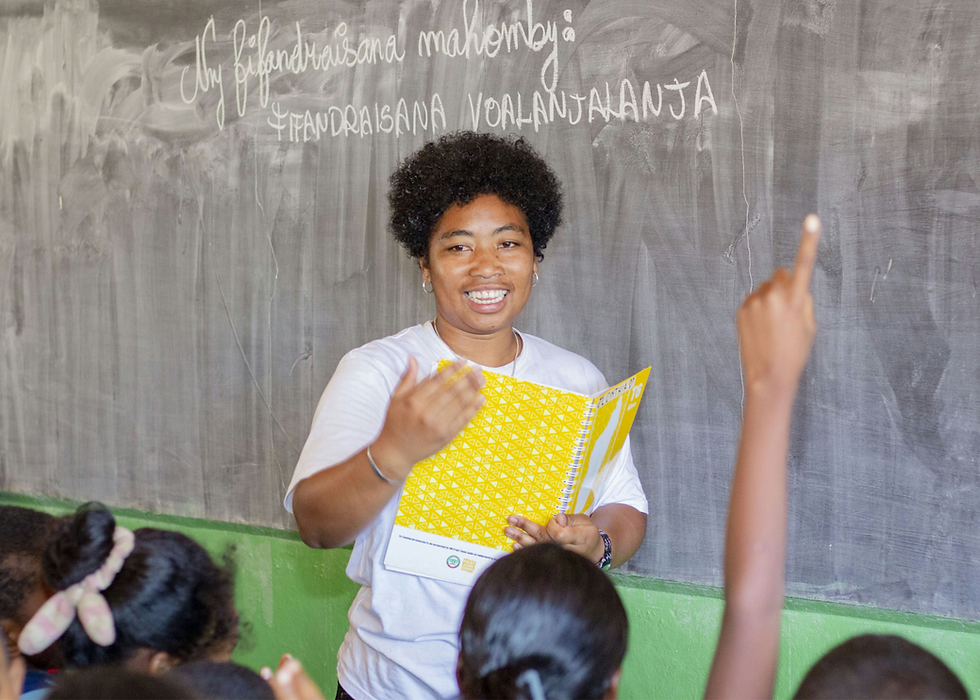Maia recognized as one of the #120under40 top young leaders in family planning
- Laura Leeson

- Sep 20, 2017
- 4 min read
Updated: Oct 23, 2021
When you talk to Maia Freudenberger about how she came up with the idea for Projet Jeune Leader, she will readily admit that it was happenstance.
As the daughter of two global citizens from the United States, Maia grew up in Fianarantsoa, Madagascar. After completing high school she returned to America for university. Once she received her degree, she was brought back to Fianarantsoa by one fortuitous Google search: she had found and secured a grant in her name - something quite unusual in and of itself - to build a recreational space for high-risk Malagasy youth in her former hometown.
It was during this project that Maia saw the need for a different kind of adolescent sexual-reproductive solution in Madagascar. "I wanted to connect the youth I was working with to SRH education and services, so I called in local organizations. I quickly realized that youth have a million questions in this area - which the peer educators provided some answers to - but this one-time meeting wasn't enough. Youth had more follow-up questions, but no one to go to."
This realization sparked her interest in researching a new model whereby educators and adolescents could create stronger, trusting relationship so that youth could not only ask questions about basic SRH knowledge, but also feel comfortable discussing more personal issues or fears surrounding puberty and sexual health. "I don't believe in one-time sex education," says Maia. "Sex ed needs to be comprehensive and continuous. That's what's fair to kids on the receiving end."
Projet Jeune Leader was born out of this core belief: that sustained, person-to-person relationships are an essential part of creating enabling environments for adolescent SRH. The reason the model became school-based was also particularly situational. During a needs assessment, Maia and her first colleagues just happened to find out that middle school students already had free hours in their school days. Why? Because of the lack of available teachers and classrooms.
What makes the PJL model further unique in that it is heavily youth-centered. The lessons are taught in fun, participatory, and youthful methods to engage students, and are lead by dynamic, highly-trained Youth Educators between the ages of 18 and 25. (Not to mention, the entire staff is made up of young people under the age of 35.)
"We took a model that already works. School-based sex ed is nothing new. But it is new for kids in Madagascar's public schools. We chose to make it fun and creative and that was a very deliberate choice from the beginning of the project. We also re-frame what it means to be a Youth Educator, making it a professional position. We help [the Youth Educators] to internalize this position as a career, and ensure they understand their responsibilities to the community. That's why we train them for two months, and monitor their work so closely."
Since 2013, Projet Jeune Leader has brought comprehensive reproductive health education and leadership development to over 29,000 young adolescents in public middle schools in and around Fianarantsoa. For her work creating and leading this organization, Maia has been named one of the 120 Under 40 winners of 2017, which recognizes 40 of the most accomplished young people working in family planning and sexual and reproductive health and rights worldwide.
Led by the Bill and Melinda Gates Institute with support from Bayer, 120 Under 40 highlights the achievements of the next generation of family planning leaders. The 40 winners are advocates, researchers, service providers, epidemiologists, medical doctors, program officers, communications/ media professionals, and like Maia, founders of NGOs and nonprofits. They work all over the world—in clinics and universities, in offices, and in the field—to advance family planning and reproductive health.
Maia was also invited as part of a smaller representative group of winners to attend special celebrations in the U.S., including meetings with leaders in the field, trainings to enhance their skills and expand their networks, and celebrations to highlight their achievements.
When asked what she hopes will result from the award, Maia says she wants to see someone take a chance with this small non-profit, to help Projet Jeune Leader reach all young adolescents in Madagascar. "We have developed a strategic plan to significantly scale our reach in the next few years. With the attention from this amazing award, we will be in a much better place to advocate for our model and increase our fundraising to take us as far as we can go."
From working in just four middle schools in the 2013-2014 school year, to now 12 in 2016-2017, Projet Jeune Leader already has some experience in the incremental, iterative scaling up process. Maia thinks the future of the project is promising. "I find it amazing that for four years we have seen the same thing: A class which isn't graded, taught by crazily-energetic 20 somethings, and the entire classroom of kids KEEP showing up, even though they technically don’t have to be there. They are so eager for information. And with those fun games and creative teaching methods they’ve never seen before – it makes for a great program."
"There’s a lot of different ways to transmit information. But, sometimes it may be best to go back to the basics: PERSON to PERSON. Let’s invest in young people’s potential to provide that information directly."



